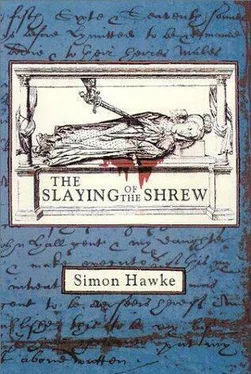Simon Hawke - The Slaying Of The Shrew
Здесь есть возможность читать онлайн «Simon Hawke - The Slaying Of The Shrew» весь текст электронной книги совершенно бесплатно (целиком полную версию без сокращений). В некоторых случаях можно слушать аудио, скачать через торрент в формате fb2 и присутствует краткое содержание. Жанр: Исторический детектив, на английском языке. Описание произведения, (предисловие) а так же отзывы посетителей доступны на портале библиотеки ЛибКат.
- Название:The Slaying Of The Shrew
- Автор:
- Жанр:
- Год:неизвестен
- ISBN:нет данных
- Рейтинг книги:5 / 5. Голосов: 1
-
Избранное:Добавить в избранное
- Отзывы:
-
Ваша оценка:
- 100
- 1
- 2
- 3
- 4
- 5
The Slaying Of The Shrew: краткое содержание, описание и аннотация
Предлагаем к чтению аннотацию, описание, краткое содержание или предисловие (зависит от того, что написал сам автор книги «The Slaying Of The Shrew»). Если вы не нашли необходимую информацию о книге — напишите в комментариях, мы постараемся отыскать её.
The Slaying Of The Shrew — читать онлайн бесплатно полную книгу (весь текст) целиком
Ниже представлен текст книги, разбитый по страницам. Система сохранения места последней прочитанной страницы, позволяет с удобством читать онлайн бесплатно книгу «The Slaying Of The Shrew», без необходимости каждый раз заново искать на чём Вы остановились. Поставьте закладку, и сможете в любой момент перейти на страницу, на которой закончили чтение.
Интервал:
Закладка:
“Because he is distraught, Elizabeth. Give the poor man some consideration. He has had a daughter murdered twice in the same day. And then there is his outrage over John being her lover, and worse yet, being a lowly groom.”
“A neighbor’s groom,” said Shakespeare. “A neighbor with whom he fancies himself to be in competition.”
“And do not forget John admitted that the dagger stuck in Catherine’s breast was his,” added Smythe. “Under the circumstances, can anyone blame Middleton for reaching the conclusion that he did? In time, when he has had a chance to recover from this heavy blow, then Middleton shall no doubt see reason and reach the same conclusions that we have. But in the meantime, we must do what we can to find the real killer.”
“And, with any luck, do so without being killed ourselves,” Shakespeare added, wryly. “God’s wounds, but this has been a day to try a man’s soul! Just when I think that things cannot possibly get any worse, they promptly do!”
“You seem to have had quite a time of it,” said Smythe. “You look a sight. What happened?”
“That fool of a driver wrecked the carriage,” Shakespeare replied.
“And some of your best clothes, it seems.”
“Aye, but that is of no consequence. What plagues me beyond all measure is that if Braithwaite was right, then if the wheel had not come off the carriage and delayed me, I could have returned in time to save Catherine’s life.”
“Oh, no, Will! Do not blame yourself for that!” Elizabeth said.
“ Elizabeth is right, Will,” said Smythe. “You are no more at fault than she is for helping Catherine, despite what Middleton has said. ‘Twas Catherine’s own choice to do what she did, as ‘twas the killer’s choice to murder her. We should not hold ourselves responsible for what others choose to do of their own free will. We can but be responsible for our own actions. Each of us must suffer the slings and arrows of his own outrageous fortune.”
“Gad, Tuck, that was well put! I wish I had said that.”
“Never fear, I am sure you will.”
“Zounds! You dare unpack your wit at my expense? I have half a mind to pay you back in kind!”
“That would make you a halfwit, then.”
“Villain!”
“Clod!”
“Scurvy knave!” “Steaming turd!” “Rustic mountebank!” “Bad poet!”
“Oh, that was base! Where is my rapier?” “You do not own one.”
“Right. I must make amends at once and buy one at the fair so that I can call you out.”
“You might buy some clothes first, so that you are fit to go out.”
Elizabeth laughed, and then brought her hands up to her head. “Oh, Heaven, that I should find myself able to laugh at such a time as this! How vile must I be?”
“Without laughter, Elizabeth, we have no saving grace at all and must perforce go mad,” said Shakespeare.
“Thank you, Will. You are a kind soul.”
“I am a damned weary soul. This has been a very long and very trying day.”
“And I have been sent packing, to leave upon the morrow,” said Elizabeth. “ ‘Tis a sad thing to be no longer welcome in this house, and yet, ‘tis a house that no longer holds any pleasant memories for me. What do you suppose will happen now?”
Smythe shook his head. “I am not sure, Elizabeth. A great deal will depend on Middleton and what he chooses to do. And then do not forget that we still have not heard from Sir William, who does not yet know the full story of all that has transpired.”
“The fair was to last three days,” said Shakespeare. “Under the circumstances, however, I do not think that anyone would blame our host if he were to cancel the remainder of it.”
“True,” Smythe said, “but at the same time, in a peculiar sort of way, nothing has really changed since we first spoke with Master Middleton, has it? I mean that at the time, we had all, except Elizabeth, of course, believed Catherine to be dead. Well, she was not, but now, she is. We also believed her to have been murdered. She was not, but now, she has been. Middleton was grieving for his daughter, yet wanted to see justice done. And now, he is still grieving for his daugher, so… what has changed?”
“Hmm, I see what you mean,” said Shakespeare. “ Tis a curious situation, indeed. Our expectations of the situation were unfounded, yet now, we have found them to be true. Most strange. I cannot imagine how I would respond in Middleton’s place. Would I wish to continue with my original plan to find the murderer and get justice, or would I fold under the weight of this new blow and wish to banish everybody from my sight?”
“Well, only Middleton can answer that,” said Smythe. “ Elizabeth, you know him best. What do you think he will do now?”
She shook her head. “Godfrey Middelton, for all his stout and doughy looks, is a strong-minded and most ambitious man. In many respects, Catherine took after him. Their similarity of character was the source of many of their clashes. They were both strong-willed and stubborn. Once she had made up her mind, Catherine would not easily be dissuaded. Her father is no different. He is not the sort of man who would forgive a slight. I cannot imagine that he could forgive the murder of his own daughter.”
“So you believe that he shall stay the course, then, and do everything possible to find the killer?” Smythe said.
“I cannot think he would do otherwise.”
They were approaching the house now. They glanced behind them and saw torches on the path not far away. The others were returning.
“There are still things we need to speak of before you must leave in the morning,” Smythe said to Elizabeth. “The rain has stopped. Will you walk with us awhile in the garden?”
“Of course. I am far from eager to retire. I do not think that I shall sleep at all tonight. And I do not really want to be alone right now.”
They reached the courtyard and turned to go around the house, to the opposite side where the garden was, with the maze, thought Smythe, where it all began for him.
“What of Blanche?” Smythe asked. “What can you tell us about her?”
Elizabeth sniffed with disapproval. “She is as strong-willed as Catherine, in her way. A very different way.” “What sort of way?” asked Shakespeare.
“Well, Blanche wants what she desires, and desires what she wants. And one way or another, she always contrives somehow to get it.”
“Spoiled, in other words,” said Shakespeare. “Her father indulges her?”
“Very much so,” Elizabeth replied. “And she plays upon him like the virginals. She is much more subtle than Catherine. At least, with him.”
“And not with other men?” asked Smythe, remembering his first impression of her.
“Not with any other men, so far as I have seen.”
“You disapprove of her?” said Shakespeare.
“ ‘Tis not for me to approve nor disapprove,” Elizabeth replied. “I simply do not like her.”
“She does not seem to want for suitors,” Smythe said.
“No. She is very beautiful, as I am sure you have remarked,” she added dryly.
“Aye, beautiful… and rather bold, I thought.”
Elizabeth raised her eyebrows. “Oh? I was not aware that you had spoken with her.”
“Only briefly, when she arrived together with the wedding party,” Smythe replied.
“Indeed? And pray tell, what did she say to you?”
“I do not recall precisely. Nothing of substance, I am sure.”
“And yet you do recall that she was bold.”
“Well, doubtless, ‘twas more in the nature of her manner than anything she said.”
“Do tell. And what was her manner towards you?”
Shakespeare chuckled. “You have found, Tuck, both the greatest fault and greatest virtue of all women. They listen.”
Читать дальшеИнтервал:
Закладка:
Похожие книги на «The Slaying Of The Shrew»
Представляем Вашему вниманию похожие книги на «The Slaying Of The Shrew» списком для выбора. Мы отобрали схожую по названию и смыслу литературу в надежде предоставить читателям больше вариантов отыскать новые, интересные, ещё непрочитанные произведения.
Обсуждение, отзывы о книге «The Slaying Of The Shrew» и просто собственные мнения читателей. Оставьте ваши комментарии, напишите, что Вы думаете о произведении, его смысле или главных героях. Укажите что конкретно понравилось, а что нет, и почему Вы так считаете.












